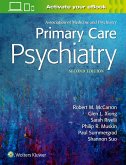- Broschiertes Buch
- Merkliste
- Auf die Merkliste
- Bewerten Bewerten
- Teilen
- Produkt teilen
- Produkterinnerung
- Produkterinnerung
Schizophrenia: The Facts provides a concise and up-to-date account of the underlying causes and symptoms of schizophrenia, as well as current theories about the disorder. The book provides a welcome source of information and advice both for families of schizophrenics and those involved in caring for them.
Andere Kunden interessierten sich auch für
![Electric Fields of the Brain Electric Fields of the Brain]() Paul L. Nunez (Emerit Emeritus Professor of Biomedical EngineeringElectric Fields of the Brain230,99 €
Paul L. Nunez (Emerit Emeritus Professor of Biomedical EngineeringElectric Fields of the Brain230,99 €![Headache Headache]() David Kernick (General Practitioner, St Thomas Medical Group, ExeteHeadache51,99 €
David Kernick (General Practitioner, St Thomas Medical Group, ExeteHeadache51,99 €![Practical Psychiatry for Students and Trainees Practical Psychiatry for Students and Trainees]() A. M. O'Dwyer (Consultant Psychiatrist, Consultant Psychiatrist, PsPractical Psychiatry for Students and Trainees42,99 €
A. M. O'Dwyer (Consultant Psychiatrist, Consultant Psychiatrist, PsPractical Psychiatry for Students and Trainees42,99 €![Shorter Oxford Textbook of Psychiatry Shorter Oxford Textbook of Psychiatry]() Paul Harrison (Professor of Psychiatry, Professor of Psychiatry, DeShorter Oxford Textbook of Psychiatry130,99 €
Paul Harrison (Professor of Psychiatry, Professor of Psychiatry, DeShorter Oxford Textbook of Psychiatry130,99 €![Stroke Stroke]() Richard I Lindley (Professor of Ge Professor of Geriatric MedicineStroke33,99 €
Richard I Lindley (Professor of Ge Professor of Geriatric MedicineStroke33,99 €![Huntington's Disease Huntington's Disease]() Oliver Quarrell (Sheffield Childre Consultant in Clinical GeneticsHuntington's Disease30,99 €
Oliver Quarrell (Sheffield Childre Consultant in Clinical GeneticsHuntington's Disease30,99 €![Primary Care Psychiatry Primary Care Psychiatry]() McCarron, Dr. Robert M., MDPrimary Care Psychiatry119,99 €
McCarron, Dr. Robert M., MDPrimary Care Psychiatry119,99 €-
-
-
Schizophrenia: The Facts provides a concise and up-to-date account of the underlying causes and symptoms of schizophrenia, as well as current theories about the disorder. The book provides a welcome source of information and advice both for families of schizophrenics and those involved in caring for them.
Hinweis: Dieser Artikel kann nur an eine deutsche Lieferadresse ausgeliefert werden.
Hinweis: Dieser Artikel kann nur an eine deutsche Lieferadresse ausgeliefert werden.
Produktdetails
- Produktdetails
- The Facts Series
- Verlag: Oxford University Press
- 4 Revised edition
- Seitenzahl: 160
- Erscheinungstermin: 16. Januar 2019
- Englisch
- Abmessung: 194mm x 127mm x 9mm
- Gewicht: 180g
- ISBN-13: 9780198813774
- ISBN-10: 0198813775
- Artikelnr.: 55000123
- Herstellerkennzeichnung
- Libri GmbH
- Europaallee 1
- 36244 Bad Hersfeld
- gpsr@libri.de
- The Facts Series
- Verlag: Oxford University Press
- 4 Revised edition
- Seitenzahl: 160
- Erscheinungstermin: 16. Januar 2019
- Englisch
- Abmessung: 194mm x 127mm x 9mm
- Gewicht: 180g
- ISBN-13: 9780198813774
- ISBN-10: 0198813775
- Artikelnr.: 55000123
- Herstellerkennzeichnung
- Libri GmbH
- Europaallee 1
- 36244 Bad Hersfeld
- gpsr@libri.de
Stephen J. Glatt, Ph.D., is the principal investigator on two Research Project grants from the U.S. National Institutes of Health, and a co-investigator or consultant on several others. Dr. Glatt is working primarily on genome-wide association and expression studies of schizophrenia, bipolar disorder, autism, post-traumatic stress disorder, substance use disorders, mild cognitive impairment, Alzheimer's disease, and other mental disorders. Dr. Glatt is an author on over 120 journal articles, invited manuscripts, and book chapters, and has been invited to present his work in numerous national and international forums. Dr. Glatt is Associate Editor of Neuropsychiatric Genetics, Editor-at-Large for Methodology and Statistics for Journal of the American Academy of Child and Adolescent Psychiatry, and an ad-hoc reviewer for many other top journals in the field of psychiatry. Stephen V. Faraone, Ph.D., studies the nature and causes of mental disorders in childhood and has made contributions to research in psychiatric genetics, psychopharmacology, diagnostic issues and methodology. An author on over 900 journal articles, editorials, chapters, and books, he was the eighth highest producer of High Impact Papers in Psychiatry from 1990 to 1999 as determined by the Institute for Scientific Information. In 2013 he was the third most highly cited researcher in psychiatry and psychology. From 2014 to 2017 he has been listed as a highly cited researcher by Thomson Reuters/Clarivate Analytics. Professor Faraone is Editor of Neuropsychiatric Genetic, Program Director of the educational website www.adhdinadults.com , Vice President of the World Federation for ADHD, and a Board member for the American Professional Society of ADHD and Related Disorders. Ming T. Tsuang, M.D., Ph.D., D.Sc. FRCPsych, is recognized worldwide for his research in schizophrenia, bipolar disorder, and substance abuse. One of his areas of interest is in the interactions between genetic and environmental risk factors for severe mental disorders. He is a member of the U.S. National Academy of Medicine, and served on the U.S. National Advisory Mental Health Council. He has been elected Fellow of the American Psychiatric Association, American College of Psychiatrists, the American Psychopathological Association, and British Royal Society of Psychiatrists, and Council Member of the Taiwan National Health Research Institute. He has authored or co-authored over 900 peer-reviewed journal articles and book chapters and books in the areas of psychiatric epidemiology and genetics, including major psychoses, substance abuse, and spiritual health. In addition to serving on many editorial boards of scientific journals, he is currently the Senior Editor of Neuropsychiatric Genetics.
1: What is schizophrenia?
2: What are the symptoms of schizophrenia?
3: How is schizophrenia diagnosed?
4: What is not schizophrenia?
5: How common is schizophrenia?
6: Is schizophrenia inherited?
7: How does the environment in?uence schizophrenia?
8: Is schizophrenia a brain disorder?
9: Is schizophrenia a neurodevelopmental disorder?
10: How is schizophrenia treated?
11: What courses and outcomes are possible in schizophrenia?
12: How can affected individuals and their families cope with schizophrenia?
Appendix 1: List of family and patient support groups
Appendix 2: Accessing clinical trials and research studies
2: What are the symptoms of schizophrenia?
3: How is schizophrenia diagnosed?
4: What is not schizophrenia?
5: How common is schizophrenia?
6: Is schizophrenia inherited?
7: How does the environment in?uence schizophrenia?
8: Is schizophrenia a brain disorder?
9: Is schizophrenia a neurodevelopmental disorder?
10: How is schizophrenia treated?
11: What courses and outcomes are possible in schizophrenia?
12: How can affected individuals and their families cope with schizophrenia?
Appendix 1: List of family and patient support groups
Appendix 2: Accessing clinical trials and research studies
1: What is schizophrenia?
2: What are the symptoms of schizophrenia?
3: How is schizophrenia diagnosed?
4: What is not schizophrenia?
5: How common is schizophrenia?
6: Is schizophrenia inherited?
7: How does the environment in?uence schizophrenia?
8: Is schizophrenia a brain disorder?
9: Is schizophrenia a neurodevelopmental disorder?
10: How is schizophrenia treated?
11: What courses and outcomes are possible in schizophrenia?
12: How can affected individuals and their families cope with schizophrenia?
Appendix 1: List of family and patient support groups
Appendix 2: Accessing clinical trials and research studies
2: What are the symptoms of schizophrenia?
3: How is schizophrenia diagnosed?
4: What is not schizophrenia?
5: How common is schizophrenia?
6: Is schizophrenia inherited?
7: How does the environment in?uence schizophrenia?
8: Is schizophrenia a brain disorder?
9: Is schizophrenia a neurodevelopmental disorder?
10: How is schizophrenia treated?
11: What courses and outcomes are possible in schizophrenia?
12: How can affected individuals and their families cope with schizophrenia?
Appendix 1: List of family and patient support groups
Appendix 2: Accessing clinical trials and research studies









